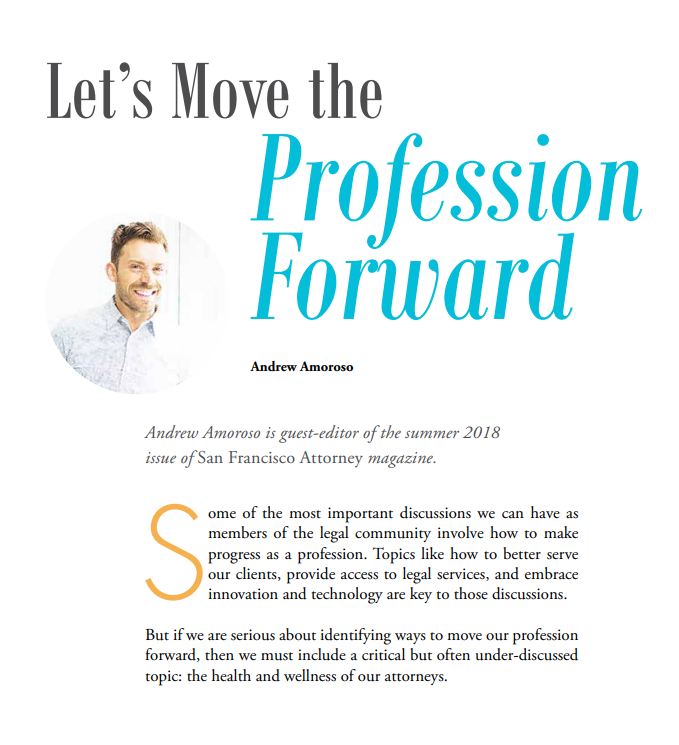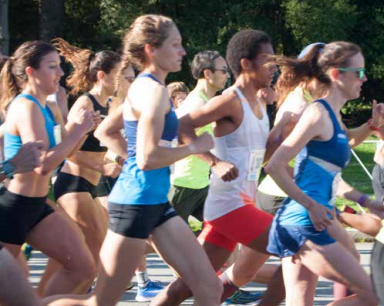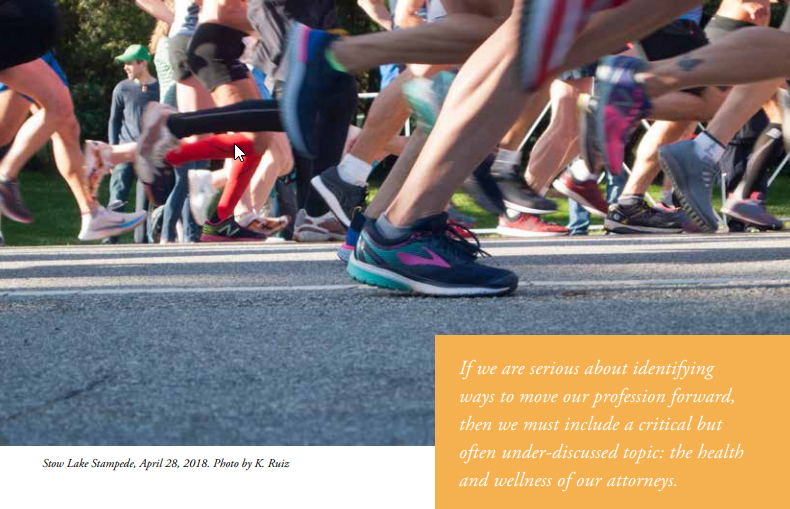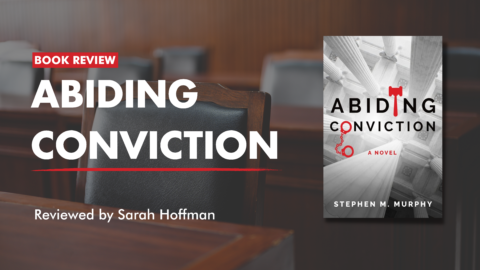
Some of the most important discussions we can have as members of the legal community involve how to make progress as a profession. Topics like how to better serve our clients, provide access to legal services, and embrace innovation and technology are key to those discussions.
But if we are serious about identifying ways to move our profession forward, then we must include a critical but often under-discussed topic: the health and wellness of our attorneys.
The important role that mental, emotional, and physical wellness plays in our profession cannot be understated. Yet, according to recent studies, there is lots of room to improve.
A 2016 study conducted by the American Bar Association and the Hazelden Betty Ford Foundation confirmed that there are widespread behavioral health problems in the U.S. legal profession. The study found that over 60 percent of attorneys surveyed experienced anxiety, 45 percent experienced depression, 11.5 percent reported suicidal thoughts at some point during their career, and more than one in five licensed, employed attorneys qualify as problem drinkers.
Attorney and clinician Patrick R. Krill, the study’s lead author, called the data “alarming,” saying it “paints the picture of an unsustainable professional culture that’s harming too many people. Attorney impairment poses risks to the struggling individuals themselves and to our communities, government, economy and society.”
The empirical data from this study confirmed what many of us have experienced first-hand: that the nature of the profession presents many challenges to promoting and prioritizing health and wellness. The long hours, pressure to perform, and stressful work environments test our ability to focus on taking care of ourselves. Alcohol has played a central role in how we socialize with one another and relieve stress. And the sedentary nature of our work does not encourage physical activity either—most of us are desk-bound and sitting inside all day.
But where there are problems, there is also opportunity for growth and change. Becoming a more wellness-focused profession begins with a recognition that it is a critical part of our ability to serve our clients, our employers, our families, and our community. How can we be the best version of ourselves and perform at a high level if we do not take our own health and wellness seriously?
The articles in the summer issue of San Francisco Attorney magazine contribute to the growing call to change the way our industry views these issues, and provide practical solutions that will help our attorneys take action. Although each article provides a different take on this important issue, one through-line you will see is that incorporating wellness into the practice comes in many forms and can be accomplished in small ways throughout your workday.
We start by highlighting a few attorneys who have prioritized wellness, and they share with us a few tips on how they have done it. This issue also includes excellent information on day-to-day wellness strategies, practicing resilience and mindfulness, and creating a wellness program at your place of work.
We face many important challenges as a profession, but working to address this one has the potential to significantly change our professional culture and the way we serve our clients and communities. I hope you will walk away with a few ideas that are simple to implement and help you prioritize taking care of yourself, your colleagues, and your employees. Let’s work together to raise the visibility of this issue in our legal community and find ways to encourage health and wellness among our peers.

Adam Kaplan, Munger, Tolles & Olson
Running has been critical to my sanity for at least the past twenty years. While I’m running, I often preview in my head what’s in store for the day or week ahead, but many times I just let my mind wander. It can be tough to get motivated after a night of too little sleep, or when there’s a busy day ahead, or when (as now) I’m still getting over a cold. But I’ve never once regretted a run or workout. No matter what, I’m always happier afterward. And my brain is always less cluttered—which is quite helpful for lawyering.
Since I started pushing my children in the running stroller about 3½ years ago, running has also been a great way to hang out with the kiddos in the morning and give my wife a chance to sleep in or sneak in her own workout.
More recently, my kids have resisted being pushed in the stroller, insisting that they, too, want to run. I accommodate them on weekends, and let them hop out and run with me for part of the time. I’m more time-pressed during the week though, so more and more of my runs have instead been with our dog. One way that I’ve taken advantage of this new captive audience is by using our runs to practice aloud any presentations that I have coming up. She vetted all of my Barristers Club speeches last year and has silently mooted me for many oral arguments.
And when the kids and the dog decide to skip our runs? I’ll be right back in my head for those miles, keeping happy and healthy.

Anjali Kulkarni, Duane Morris
For me, wellness is about balance. I try to make sure to take time for my personal life, and the things and people who make me feel happy, both with myself and with the world I exist in. I got into CrossFit and Olympic weightlifting several years ago, and find that those activities help me to manage stress levels and give me something to strive for outside of my career. Setting and achieving goals both inside and outside of the office helps to keep me feeling like my life is multidimensional, and I’m not only a lawyer but also an athlete, which is important to me.
Another thing I’ve found to be super important is the people I surround myself with. Keeping the people in my life who not only encourage me to be the best version of myself but also consistently support me when I have setbacks and remind me to be kind to myself has been immeasurably beneficial. As attorneys, I think we tend to be harder on ourselves than most people. Having high standards for yourself is obviously hugely beneficial professionally, but so is forgiving yourself for making mistakes, which inevitably happen. I strive to keep balance in my attitudes, interactions and time each day, and that keeps me grounded and happy (mostly).

Tyler Layton, Vinson & Elkins
Incorporating a wellness routine (in my case, regular physical exercise) into my workweek has markedly improved my job performance, reduced my stress level and increased my overall sense of job satisfaction. Attorneys – especially those in early career – should not think of wellness and self-care as frivolous or a luxury, but rather as important tools to maintain a high level of performance and avoid unnecessary burnout.
I’m an associate at a large law firm in my sixth year of practice. Making the transition from student to legal professional is a stressful process, and working in “big law” brings its own unique challenges. For the first few years of practice, I chose to manage and mitigate my early career anxiety by putting in long hours and focusing on building my skillset, largely neglecting health and wellness. This was effective to an extent in dealing with early career anxiety, but junior associate stress (“can I do this job!?”) is inevitably replaced by mid-level and senior associate stress (“can I do this job for another 30 years!?”). I realized that hard work and skill-building, without more, would not prevent burnout.
Fortunately for me, my wife is a clinical psychologist, specializing in treating stress and anxiety issues. She’s an advocate for wellness and self-care, and in my fourth year of practice, I took her advice and got into the gym. Regular physical exercise has been a game changer for me (I enjoy CrossFit, but I’ll spare you the sermon). Making time in my workday for exercise has lifted my mood (physical activity stimulates the release of dopamine, norepinephrine and serotonin) and has improved my diet and the quality of my sleep. The cumulative effect has been a reduction in my stress level, particularly around work issues. I feel better equipped to deal with the rigors of the profession in the short and long term.
Early career attorneys can borrow a lesson from the world of competitive cycling. Any good training plan will emphasize rest, recovery and nutrition alongside high-intensity training. A racer will not be competitive unless she takes rest days, monitors her health and nutrition, gets proper sleep (even the occasional midday nap!) and generally takes steps to avoid physical and mental burnout. A legal career is a long and sometimes grueling race; take a lesson from the peloton and take care of yourself along the way.
Drew Amoroso is the President of the Barristers Club and founder of Move Associates, a company that helps law firms train their associates to achieve their performance and productivity goals, accelerate their professional development, and add value to the firm and its clients.





